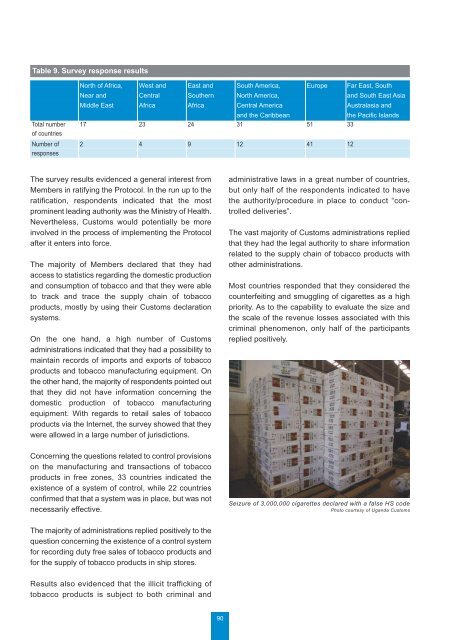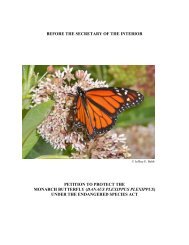You also want an ePaper? Increase the reach of your titles
YUMPU automatically turns print PDFs into web optimized ePapers that Google loves.
Table 9. Survey response results<br />
North of Africa, West and East and South America, Europe Far East, South<br />
Near and Central Southern North America, and South East Asia<br />
Middle East Africa Africa Central America Australasia and<br />
and the Caribbean<br />
the Pacific Islands<br />
Total number 17 23 24 31 51 33<br />
of countries<br />
Number of 2 4 9 12 41 12<br />
responses<br />
The survey results evidenced a general interest from<br />
Members in ratifying the Protocol. In the run up to the<br />
ratification, respondents indicated that the most<br />
prominent leading authority was the Ministry of Health.<br />
Nevertheless, Customs would potentially be more<br />
involved in the process of implementing the Protocol<br />
after it enters into force.<br />
The majority of Members declared that they had<br />
access to statistics regarding the domestic production<br />
and consumption of tobacco and that they were able<br />
to track and trace the supply chain of tobacco<br />
products, mostly by using their Customs declaration<br />
systems.<br />
On the one hand, a high number of Customs<br />
administrations indicated that they had a possibility to<br />
maintain records of imports and exports of tobacco<br />
products and tobacco manufacturing equipment. On<br />
the other hand, the majority of respondents pointed out<br />
that they did not have information concerning the<br />
domestic production of tobacco manufacturing<br />
equipment. With regards to retail sales of tobacco<br />
products via the Internet, the survey showed that they<br />
were allowed in a large number of jurisdictions.<br />
administrative laws in a great number of countries,<br />
but only half of the respondents indicated to have<br />
the authority/procedure in place to conduct “controlled<br />
deliveries”.<br />
The vast majority of Customs administrations replied<br />
that they had the legal authority to share information<br />
related to the supply chain of tobacco products with<br />
other administrations.<br />
Most countries responded that they considered the<br />
counterfeiting and smuggling of cigarettes as a high<br />
priority. As to the capability to evaluate the size and<br />
the scale of the revenue losses associated with this<br />
criminal phenomenon, only half of the participants<br />
replied positively.<br />
Concerning the questions related to control provisions<br />
on the manufacturing and transactions of tobacco<br />
products in free zones, 33 countries indicated the<br />
existence of a system of control, while 22 countries<br />
confirmed that that a system was in place, but was not<br />
necessarily effective.<br />
Seizure of 3,000,000 cigarettes declared with a false HS code<br />
Photo courtesy of Uganda Customs<br />
The majority of administrations replied positively to the<br />
question concerning the existence of a control system<br />
for recording duty free sales of tobacco products and<br />
for the supply of tobacco products in ship stores.<br />
Results also evidenced that the <strong>illicit</strong> trafficking of<br />
tobacco products is subject to both criminal and<br />
90




